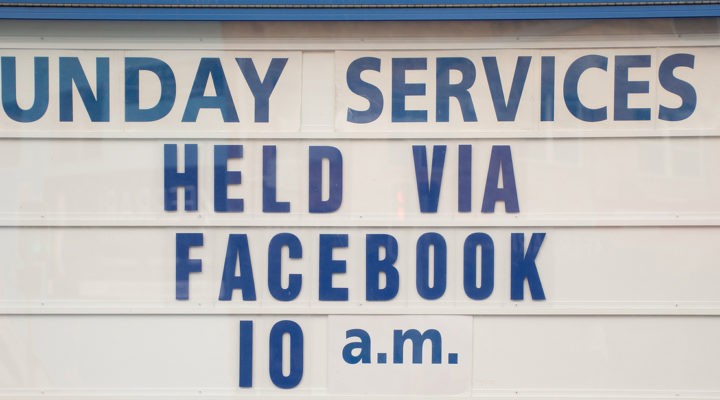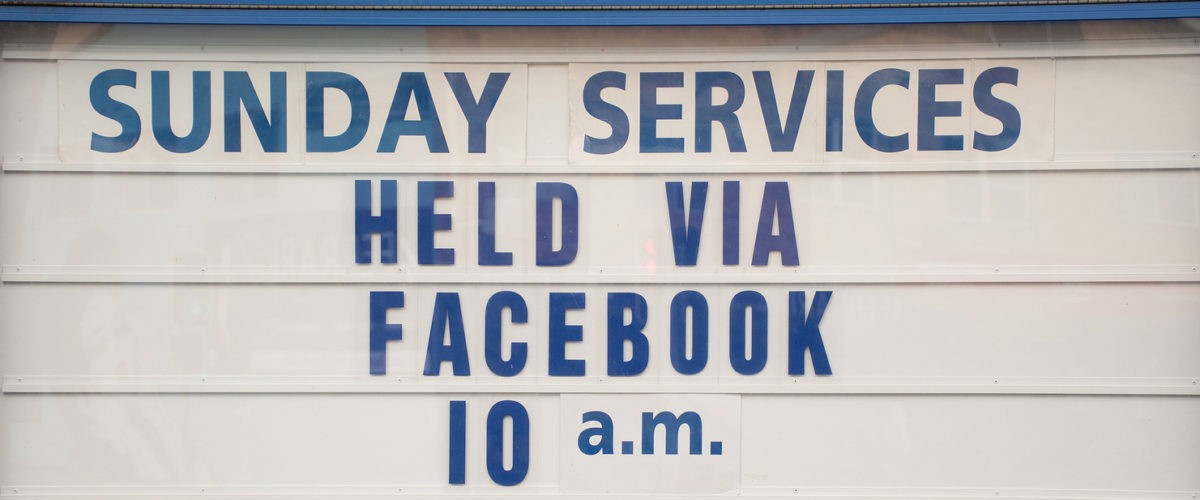Welcoming receptions with cookies and punch. Casual chat in church hallways before Sunday school. After-worship coffee hours topped with doughnuts. Potluck suppers laden with fried chicken and potato salad.
Pastors new to their congregations have missed a lot of these traditional get-acquainted venues in the past year, thanks to the public health warnings against in-person gatherings to stave off the coronavirus pandemic. Instead, new pastors have tapped their imaginations to find ways to get to know their congregations with few face-to-face encounters.
This has been especially challenging to United Methodist pastors, who more frequently move among parishes due to the structure of the denomination. Rather than being called to a pulpit by a local congregation, United Methodist pastors are appointed by bishops after consultation with district superintendents and church personnel committees. The process can be demanding for everyone involved, but it typically starts a chain of personal meetings that help pastors integrate into faith communities.
Not so in the past 12 months, the year of COVID-19.
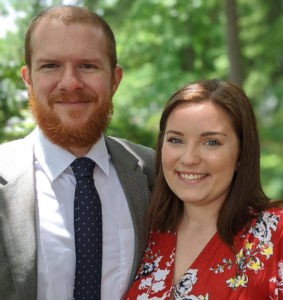
Sam and Abby Mitchell
Samuel Mitchell, pastor of Trinity United Methodist Church in Chesapeake City, Md., learned of his first full-time appointment in March 2020, two months before he graduated from Wesley Theological Seminary in Washington, D.C. Everyone was masked and physically distanced when Mitchell met with the church’s staff-parish relations committee.
“It was fortunate that folks were excited at having a change,” said Mitchell, who had worked part-time in churches for five years while completing his master of divinity degree. “That always helps.”
As soon as his appointment was settled, Mitchell began meeting with church leaders to plan outdoor services for the summer. The church had been holding worship online since March.
“We took real advantage of the nice weather in summer and fall,” Mitchell said. “We had backyard barbecues, dinners on the porch, coffee klatches outside. I met as many people as I could manage in the first four months.”
Forging ongoing relationships was another matter, however.
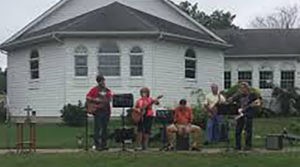
Outdoor worship at Trinity UMC.
“At first we tried in-person worship indoors for November,” Mitchell said. “We switched to the Fellowship Hall where we could have more space between people. It was all right, because the numbers of COVID infections were really low until Thanksgiving. Then COVID numbers skyrocketed. Schools went back online, and we went back online.”
“When cold weather came and we couldn’t meet outside, I got pretty down about it,” Mitchell added. “I really had to pray through. But God calls us into the world as it is.”
In order to build connections in the congregation, he instituted a practice that’s controversial among United Methodists — virtual observance of Holy Communion, or the Lord’s Supper.
“I feel it’s important to have Communion whenever possible, and I’m of the opinion it’s OK to have it online,” Mitchell explained. “I prepare people as to what to use for elements. Online it’s more of a pragmatic ritual. I tell people when to get out the elements and when to receive after I give the blessing. Clear instructions are always helpful, but now they’re essential.”
In addition to virtual worship and online Bible study, Mitchell said he calls his church members regularly and allows plenty of time for them to talk, especially those he hasn’t heard from in a while. He also makes an effort at self-care to stave off the loneliness of not seeing people regularly.
“I spend time with God in nature, and I share a meal with someone at least once a week,” Mitchell said. “I’ve been impressed by how gracious both God and my congregation have been. It has not been easy in any sense of the word to start a new pastorate, your first pastorate, let alone in a pandemic. God led the way, and the community has responded well.”
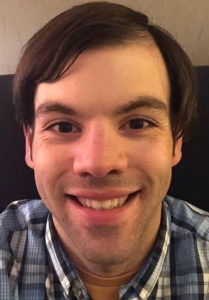
Douglas Clement
Douglas Clement became pastor of Portage United Methodist Church, about 45 minutes north of Madison near the Wisconsin Dells, in July 2020. Officially the congregation has 370 members and drew 170 to 190 people regularly in worship before the pandemic. These days, he’s not sure how many people he’s reaching.
Clement said the coronavirus pandemic has taught him how much relationship building happens in casual, unstructured contacts. Prior to the pandemic, worship and fellowship were primary functions. Not being able to do those things in person has been a real challenge for making connections, the pastor said.
“Now if I have to schedule a phone call or a Zoom meeting, it feels like I have to have a purpose,” he said.
Clement described his method for getting acquainted as “throw the spaghetti at the wall and see what sticks. And if you don’t succeed at first, try again.”
The Wisconsin pastor said initially he tried to use the church directory to call his members. Then he tried calling on their birthdays. He began a coffee hour on Zoom, but that petered out.
“The trouble is, you don’t know who you don’t know,” Clement said. “People who don’t have access to technology or who don’t come to a drive-in service get lower down on the contact list.” To compensate, Clement has relied on church members and staff to let him know who needs a call.
“One of the phrases I’ve heard is that there’s a new understanding from folks that a lot of cross-connection was taken for granted.”
“We’ve been challenged by a fixation on worship and whether it’s in person; that’s hampered finding ways to connect during COVID,” Clement said. “We’re so used to familiar ways of connecting that it’s hard to do otherwise, especially how to connect and deal with the grief of not being in person. One of the phrases I’ve heard is that there’s a new understanding from folks that a lot of cross-connection was taken for granted.”
The most effective way Portage UMC addressed in-person gatherings was drive-in services, the pastor said. Drive-in services have continued despite Wisconsin’s winter weather, he added.
“People who come to the drive-in service don’t connect other ways,” he said. “We transmit over FM radio, so people can tune in on car radios and hear me from inside the church. It’s like the experience of a drive-in theater. People can see one another and wave to one another. They can sing because they’re in their own pods. They can see the building and have the feeling that they’ve intentionally come to worship.”
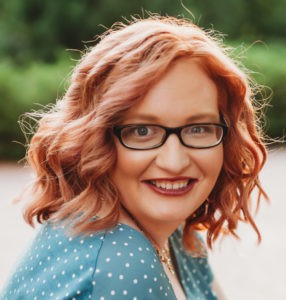
Chrisie Reeves-Pendergrass
The pandemic posed an especially difficult challenge for Chrisie Reeves-Pendergrass, an associate pastor at St. Matthew United Methodist Church in Greenville, S.C. Trained as a church planter, she was appointed to her church as minister of outreach to the church and its surrounding community through the South Carolina Annual (regional) Conference’s community development program.
Reeves-Pendergrass said she found her first task to be “figuring out who in the congregation is connected to the surrounding community” using phone calls and social media. “Otherwise I would have pounded the pavement a lot more,” she said.
Now she has her photograph on her business cards and in emails “so people can see I’m a real person.”
“There’s an incarnational aspect to it,” Reeves-Pendergrass said. “It’s about how to recreate that embodiment of Jesus creatively.”
The associate pastor said she has used “lots of Facebook Live videos, lots of Zoom calls.” Some sessions she has insisted on being “purely social with no church business.”
“We’ve had to forge a certain level of social interaction,” Reeves-Pendergrass said. “It’s inorganic but necessary.”
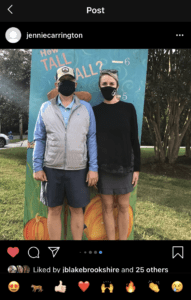
Pumpkin Patch social media photo station at St. Matthew UMC.
As outreach minister, she has used unusual ways to meet the “extravagant needs” of the world. Among these:
- A Pumpkin Patch and social media photo contest with $10 prizes contributed by local businesses that raised $20,000 for outreach projects. “It was our banner year,” she said.
- Cooperating with the church’s next-door neighbor, a YMCA with outside space. “We plan to start older adult ‘pickle ball’ in the spring.”
- A drive-in movie night that drew 47 cars, set up in a field behind the church using an inflatable movie screen and broadcast over FM radio.
- A blood drive the day before Thanksgiving that capitalized on the critical need of blood banks depleted because people were reluctant to donate and risk coronavirus infection. “We also gave COVID antibody tests as well.”
- Making food and assistance baskets for those who lost their jobs in the pandemic. “My office was overrun with donations because it was something people could do.”
All three pastors said the isolation of the coronavirus pandemic would have been harder to withstand were it not for concerted efforts to get in touch in new ways.
“I moved here from Columbia, about two hours away, and lost my support network,” Reeves-Pendergrass said. “I’ve come to know how disorienting this pandemic is. We’re not fully shut down, but it feels alien. I can’t see people behind masks; preaching to people you don’t know and can’t see is really hard. In my previous appointment I knew members well enough that I could read their eyes. Here it took a while because I couldn’t see or know them. I didn’t realize how much of my preaching depended on that.”
Clement echoed the need for connection. “One of the things that has been vital to me in this whole pandemic time has been my connection to my colleagues in ministry, lay and clergy. The amount of communication we’ve done personally and professionally to support each other, to process with each other, to share ideas, really worked for us. It has been a real lifeline, peer-to-peer support.”
“One of the things that has been vital to me … has been my connection to my colleagues in ministry, lay and clergy.”
Mitchell found himself in a time-bending experience. “I guess I would just say: be mindful of the fact that time moves very differently than it ever has. There are days when it feels like I’ve been here five years, and days when it feels like I’ve only been here five days. It took me six months to meet the same number of people I could have met at one dinner. I don’t get upset about it; I just appreciate that I have more time to meet folks than I normally would.”
Despite its challenges and drawbacks, the pandemic has bestowed unexpected blessings, according to all three pastors.
Mitchell summed up the experience, saying the pandemic “has been a great connection point between church and community. Every sermon, every Bible study applies to life. I mean, how often do you live through a biblical plague? The struggles of life are more real than ever for folks; the need to really live the gospel has never been greater.”
Cynthia B. Astle is a veteran journalist who has covered the worldwide United Methodist Church at all levels for more than 30 years. She serves as editor of United Methodist Insight, an online journal she founded in 2011.
Related articles:
What we’ve lost| Opinion by Mark Wingfield
6 ways to support your ministers through this pandemic | Opinion by David Burroughs
Rethink church staff evaluations during a pandemic | Opinion by Terry Maples

